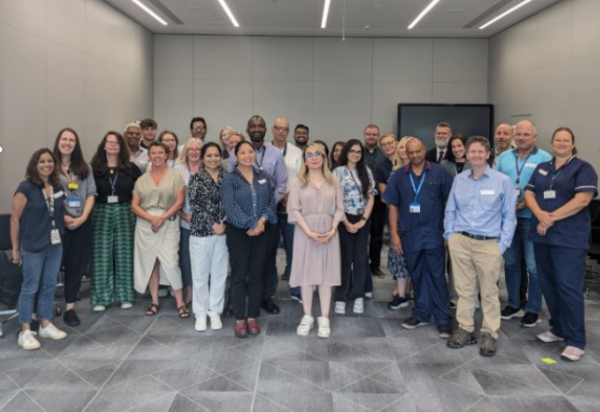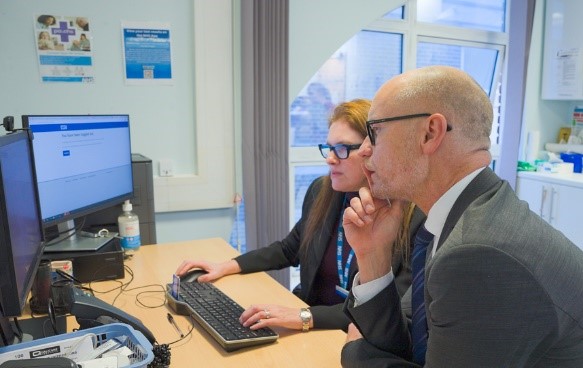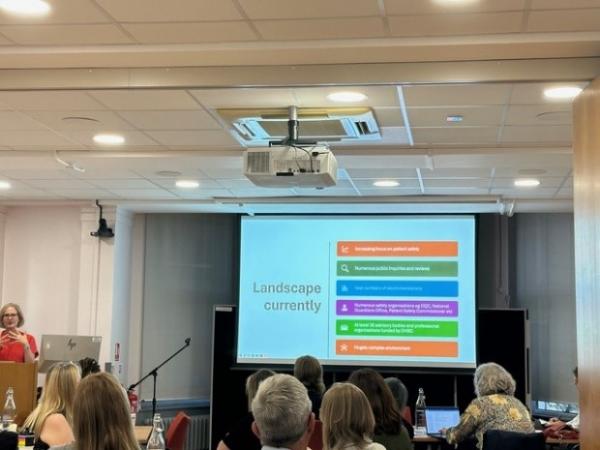|
NW London System Update: November 2025
|
|
|
|
Foreword by Frances O’Callaghan, chief executive
Welcome to our November update.
I want to thank colleagues across the NHS and local authorities for the very warm welcome I have received since becoming chief executive of NHS North West London last month. It has been a pleasure to meet many of you and I look forward to getting to know you all in the months and years ahead.
As confirmed in our previous update, North West London and North Central ICBs will merge to form a single body, West and North London ICB, from April 2026. Ahead of that, we will need to carry out a formal staff consultation to consider the impacts of the merger. That consultation is currently expected to take place in December and will not include proposed future staffing structures. We will share more once national guidance on redundancy funding is confirmed. We continue to await national guidance on the availability of funding for staff redundancies, which would be needed to support a staffing restructure. Our expectation is that existing staff will initially ‘lift and shift’ to the new structures. We recognise this is creating uncertainty for our staff and is far from ideal.
At executive level, we have completed a restructure and I want to thank all executive directors for the professionalism and courtesy with which they have approached this process. Our new executive directors are now in place and we are transitioning teams to work within the new directorate structures. I recognise that as in any such process, we will lose great leaders from the organisation and I am grateful to the many people who have reached out to support ICB colleagues who are impacted by the changes.
Finally, this month, I wanted to plug our upcoming Health Equity Summit, which will take place at the Sattavis Patidar Centre (Brent) on 25 November 2025. Please do come along to this important celebration and discussion of work to promote health equity across north west London and please do nominate deserving colleagues for Health Equity Awards if you have not already done so.
Best wishes,
Frances, Chief Executive Officer, NHS North West London
|
|
|
|
New Executive Directors appointed for North Central and North West London ICBs
|
Following an appointments process, we’re pleased to introduce the new Executive team for North Central London and North West London ICBs:
- Stephen Bloomer, Chief Finance Officer and Deputy CEO
- Dr Jo Sauvage, Chief Medical Officer
- Jennifer Roye, Chief Nursing Officer
- Richard Dale, Chief Strategy Officer
- Sarah McDonnell-Davies, Chief Transformation Officer
- Sarah Morgan, Chief People Officer
- Ian Porter, Executive Director of Transition.
Frances O’Callaghan was appointed as Chief Executive Officer for both organisations in September 2025. Learn more about the new team. |
|
|
Health Equity Summit and Awards
|
We are inviting key partners from local authorities, NHS provider trusts, as well as our voluntary and community sector organisations, to our annual North West London Health Equity Summit, taking place on Tuesday 25 November 2025 at Sattavis Patidar Centre in Wembley, Brent. The theme for this year’s summit is delivering health equity through the lens of neighbourhood health, bringing together senior leaders, clinicians, community partners, and other stakeholders from across the Integrated Care System. The event will include interactive workshops based on three key themes: Addressing inequalities in access through models of care, embedding wider social determinants of health into holistic and preventative approaches to ill health and a Population health management approach to identify need to co-producing solutions. The Sattavis Patidar Centre is located on Forty Avenue, J/W The Avenue, Wembley Park, HA9 9PE. The venue is a 10 minute walk from Wembley Park Station, which provides travel via the Jubilee and Metropolitan lines. Wembley Central station, served by National Rail, Overground, and the Bakerloo line, provides easy access to the venue from south, central, west London and Watford Junction. It’s a 25-minute walk or a short bus ride away. Piccadilly line services can be accessed via a short bus ride to Alperton and Sudbury Town stations. Find out more on our website and register now. |
|
|
|
Hospital discharges and supporting residents in the community
|
The North West London Integrated Care Board has a new provider for Discharge Personal Health Budgets. One-off personal health budgets are used in a hospital discharge pathway to facilitate timely discharges where there would otherwise be a delay. The individual is medically fit for discharge but something is preventing the discharge, such as a one-off service or item, e.g. home requires hygiene clean, or a fridge to store medication; perhaps a bed needs to be moved. Small personal health budgets are made available for discharge teams for the service or item to be quickly sourced, enabling a timely discharge. Early evidence indicates savings to the system not just in bed days but in supporting people to return home without unnecessary delays. To date north west London has undertaken 1712 Discharge PHBs which has resulted in over 8,000 bed days saved and over £3 million in cost savings  Hounslow Care Together launched in September 2025 to support residents with frailty and unmet health needs. This new model brings together multi-disciplinary teams from local NHS services, council, voluntary groups, and pharmacists to deliver joined-up, personalised care closer to home. The 12-month pilot in Hounslow Heath Primary Care Network will support up to 400 patients across six GP practices. It targets those with complex health and social challenges who frequently use services but aren’t well-supported by current pathways. Neighbourhood teams will identify residents, carry out home visits, create tailored care plans, and connect people to community services. The goal is to reduce hospital reliance, prevent crises, and help residents live well at home. This approach aims to fix long-standing issues like disconnected services, long waits, and delayed discharges — making care more proactive, preventative, and person-centred. |
|
|
The Harrow Integrated Cardio-Renal-Metabolic (CRM) Model is transforming care for people living with long-term conditions such as heart failure, chronic kidney disease and type 2 diabetes. Affecting 20% of Harrow’s population but driving over 70% of hospital bed days, these conditions demand a new approach. The CRM model brings together primary care, community, mental health, social care, and public health teams to deliver personalised, preventive, and coordinated care. Using population health data and neighbourhood-based multidisciplinary teams, it tackles fragmented pathways, builds trust within local communities, and supports North West London’s ambition for proactive, integrated neighbourhood health. Early results from the Harrow demonstrator site include 70% of participants achieved weight loss, a key modifier of CRM risk. The full case study is available in a PDF. |
|
|
|
Visit from Health Minister
|
 In September, Stephen Kinnock MP, Minister of State for Care, visited Grand Union Health Centre in west London ahead of the new GP contract changes launching on 1 October 2025. These changes will require GP practices to keep their online consultation tools available throughout core hours, helping to improve patient access to appointments. During the visit, Dr Naomi Katz, Clinical Director for West Hill Health and ICB Clinical Lead, welcomed Mr Kinnock and showcased how the practice efficiently manages appointment flows. She also highlighted the ongoing efforts to encourage use of the NHS App, which allows West London patients to book appointments at St Charles Centre for Health and Wellbeing and Violet Melchett Health & Wellbeing Centre — including evenings, weekends and bank holidays. The visit also provided an opportunity to spotlight the success of the West London Access Programme, which continues to deliver positive results in the Ipsos Mori GP Patient Survey. |
|
|
|
Children and young people
|
 On 22 September 2025, colleagues from across north west London came together for a collaborative workshop co-chaired by Kate Barker (Director of Clinical Programmes, NHS North West London) and Professor Mando Watson (Consultant Paediatrician, St Mary’s Hospital, Imperial College Healthcare NHS Trust). The event featured an inspiring presentation from Dr Camilla Kingdon (Consultant Paediatrician, Guy’s & St Thomas NHS Trust). The session explored what “good” looks like for children’s hearing services across north west London, highlighting five key themes: workforce development, co-production with families, governance and safety, infrastructure gaps, and outcome measures. Next steps include developing a north west London-wide service specification, competency framework, and standardised job grades. Cross-trust collaboration will be strengthened through shared governance mechanisms and peer review networks. Demand and capacity modelling will inform workforce planning, while an annual North West London Audiology Conference and reflective practice sessions will support continuous learning. The event reignited momentum for a joined-up, resilient approach to improving outcomes for children and families across north west London. |
|
|
Our next quarterly residents’ forum will take place on MS Teams on Monday 24 November 2025, 6 – 7.30pm, and colleagues are warmly invited to attend. The meeting will be chaired by Anita Charlesworth, non-executive director of both ICBs, and our new CEO, Frances O’Callaghan, will attend. The agenda includes an update on the merger by Frances, and a discussion about the neighbourhood teams programme. Find the full agenda and how to register on our website. |
Harrow Borough held a Harrow Health and Wellbeing Fair on 21 October 2025, bringing together residents, local services and community partners for a vibrant day of health promotion, connection and empowerment. The event, hosted at Victoria Hall was a collaborative effort in partnership with voluntary sector organisations, local authority colleagues, and NHS North West London. It aimed to support residents in taking proactive steps toward better health and wellbeing - particularly those living with multiple long-term conditions.  Over 100 attendees engaged with partner organisations taking part in activities, including free health checks, mental health support and social prescribing. The fair also show-cased the borough’s commitment to integrated, person-centred care - aligning with the Cardio-Renal Metabolic pilot in Harrow, which focuses on treating the whole person and addressing multi-morbidity through joined-up support. |
|
|
|
Programme activity and enabling hub development
NHS North West London’s strategic estates team has worked with the borough based teams, primary care and finance to identify nearly 90 schemes required under our estates strategy. This work aligns with the NHS 10 Year Plan and proposes left shift of acute services into community settings. This involves developing integrated neighbourhood hubs in collaboration with Trusts and third party developers (e.g. conversion of the Nestle Canteen (Hillingdon), Alperton (Brent) Greystar and Southall Park Avenue & Gasworks sites (Ealing), and enabling the expansion of primary care to ensure sufficient healthcare capacity capable of accommodating vast population growth (e.g. around Central Middlesex Hospital following proposed growth resulting from the Old Oak & Park Royal Development).
The estates strategy business case ring-fences the revenue requirement over the next five years and will be partially supported by drawing on circa £1.7m of Rates Recovery funding in years 1 and 2. The case was supported by the ICB in October 2025 and involves numerous priority schemes progressing to delivery e.g. the Bush Doctors relocation (Hammersmith & Fulham), Harefield expansion (Hillingdon), various installation of portacabins and Willesden Green iHub & Wembley Park integrated hub schemes (Brent).
To tackle the issues of NHS North West London paying in the region of £9m for void and unused bookable space each year at NHS property company sites, major restacking projects are underway with our Trusts, borough teams and property companies to reconfigure and refurbish a number of underutilised sites (including Jubilee Gardens (Ealing), St Charles (RBKC), Alexandra Avenue (Harrow), Parkview (Hammersmith & Fulham), Heart of Hounslow (Hounslow), The Meadows (Hounslow). Stricter governance is in place, driven by Estates, to ensure more sustainable use of space and ensure formal lease agreements are in place between tenants and property companies.
Affordability is supported by a number of non-recurrent funding options including significant Developer Contributions (s106) and Community Infrastructure Levy (CIL) which we’ve successfully worked with local authorities to secure and drawdown.
Our strategic estates team are supporting ICB executives with reviewing estates activity as part of the merger process. Discussions have also started with NHS property companies around handing back no longer required space.
Utilisation and modernisation funded (UMF) and London improvement grant (LIG) projects
Drawing on £4.2m of available one-off national funding (including £1.7m of revenue for digitisation), our Estates team is delivering its biggest redevelopment project yet. The programme covers 2025/26 and 2026/27. It involves the digitisation of medical records across 47 practices before converting vacant, already demised GP space to create additional clinical capacity for primary care. Solutions include introduction of teleconsulting pods, conversion to clinical/examination space or installation of virtual desks. These works are expected to generate over one million appointments per annum following completion. Digitisation suppliers are now on board and progressing digitisation activity with GPs. Delivery of UMF schemes by QTS will commence once the programme business case is formally approved by NHS England this month.
Work is underway to implement eight London Improvement Grant Schemes. These look at improving the condition of sites; physical access to/within premises; lighting, heating and ventilation; enabling emergency planning; and addressing other fabric improvements. Identified schemes have been endorsed as part of the expressions of interest phase and are now progressing through the due diligence stage. Once approved by NHS England, we can move to implementation with delivery required by March 2026.
Infrastructure planning with local authorities
When responding to population growth and s106, Estates will bid for developer (s106) or local authority (CIL) funding on behalf of primary care, Trusts and other ICS suppliers. Schemes are required to enhance healthcare capacity in the face of developer growth and significant infrastructure regeneration. Strategic Estates have been successful in securing over £18m to date, which have helped to fund multiple projects including South Kilburn & Wembley Park Primary Care developments, Chiswick and Northwood & Pinner rebuilds, Heart of Hounslow hub development, Hillcrest relocation, and the recent Cloister Road redevelopment and teleconsulting pods project.
Our Strategic estates team were successful in reclaiming £1.4m of s106 funding in Ealing, which will support West London NHS Trust with the delivery of its Children Services Hub this year at Carmelita House, Ealing. Additional bidding, led by Estates, is underway across a number of hotspot areas including Brentford and Feltham (Hounslow) and Earls Court (Hammersmith & Fulham).
The Strategic Estates team has now fed into five of eight local authority local infrastructure delivery plans. Conversations have started with Brent, Hammersmith & Fulham and Royal Borough of Kensington & Chelsea to complete these.
Sustainability and Green Plan activity
NHS England are working with trusts to improve future proofing of sites (particularly in terms of improving building condition, heating and cooling systems) in response to changing climate conditions and extreme temperature changes. All Trusts are actively being encouraged to use the Climate Change Risk Assessment Tool (CCRA) to inform their Climate Adaptation Plans and budgeting.
Work continues with trusts and other providers around the consolidation of nursing homes, facilitated by Estates.
We have also commissioned independent surveyors to conduct an assessment of service charges and facilities management fees across a number of NHS property company sites to ensure appropriate charging, value for money and to improve attraction and retention of tenants.
|
|
|
|
|